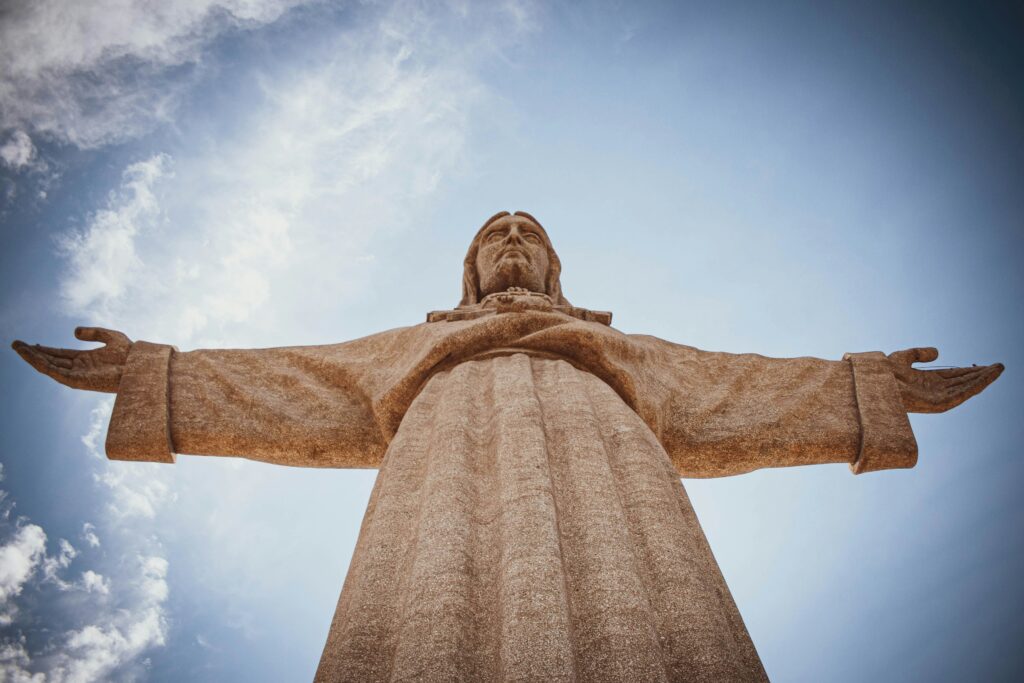
Here is the irrefutable evidence of Jesus Christ being Yahweh God in the flesh. Glorifying the true essence of the Triune God. This is a strong passage for the deity of Christ, people often times try to twist the clear meaning of this passage, but there is no way of getting around the obvious.
Hebrews 1:1
“Long ago, at many times and in many ways, God spoke to our fathers by the prophets,”
First thing to acknowledge is that all scripture is divinely inspired by the Holy Spirit.
- “16 All Scripture is given by inspiration of God, and is profitable for doctrine, for reproof, for correction, for instruction in righteousness,” – 2 Timothy 3:16 (ESV)
- “21 For no prophecy was ever produced by the will of man, but men spoke from God as they were carried along by the Holy Spirit.” 2 Peter 1:20-21 (ESV)
In the Old Testament, God appeared in various ways to prophets and notable figures. Several verses describe these visible manifestations of God. The prophets also wrote about Jesus Christ, as evidenced in passages such as Luke 24:25-27 and 44-48.
Hebrews 1:2
“but in these last days he has spoken to us by his Son, whom he appointed the heir of ALL THINGS, through whom also he created the world (αἰῶνας – aiōnas).”
“…these last days he has spoken to us by his Son…”
This verse is sometimes misunderstood. It doesn’t suggest that God is only now revealing himself through his son Jesus Christ. Instead, it emphasizes that God the Father reveals himself exclusively through his Son ever since he came into the world. As John 1:18 clarifies, Jesus has been making himself and his father known since the Old Testament period.
https://answeringislamblog.wordpress.com/?s=John+1%3A18
“whom he appointed the heir of all things…”
Hebrews 1:2 signifies Jesus Christ’s inheritance of all creation. As the inheritor of everything created, Jesus takes on this role not only because of his humanity but also to facilitate the eventual culmination where Christ and God will reign over all in the new heaven and new earth.
- 9 “I kept looking Until thrones (plural) were set up, And the Ancient of Days was seated; His clothing was like white snow And the hair of His head like pure wool. His throne (singular) was ablaze with fire, Its wheels were a burning fire. 10 A river of fire was flowing And coming out from before Him; Thousands upon thousands were attending Him, And myriads upon myriads were standing before Him; The court sat, And the books were opened. 11 Then I kept looking because of the sound of the great boastful words which the horn was speaking; I kept looking until the beast was killed, and its body was destroyed and given to the burning fire. 12 As for the rest of the beasts, their dominion was taken away, but an extension of life was given to them for an appointed season of time. 13 I kept looking in the night visions, And behold, with the clouds of heaven One LIKE a Son of Man was coming, And He came up to the Ancient of Days And came near before Him. 14 And to Him was given dominion, Glory, and a kingdom, That all the peoples, nations, and men of every tongue Might serve יִפְלְח֑וּן (yip̄·lə·ḥūn) Him. His dominion is an everlasting dominion Which will not be taken away; And His kingdom is one Which will not be destroyed.” – Daniel 7:9-14 (LSB, Lexicon: 9, 14)
In Daniel 7:9-14, the passage describes a vision where thrones are set up, and the Ancient of Days, a divine figure, is seated on His throne. He is described in majestic terms, with clothing white as snow and hair like pure wool. Surrounding Him are thousands upon thousands attending Him, and myriads upon myriads standing before Him. The scene depicts a court session, with books opened for judgment. Other articles on this:
- https://www.answering-islam.org/authors/shamoun/messiah_sonofman.html
- https://www.answering-islam.org/authors/thompson/rebuttals/ibnanwar/dan7_13-14.html
Then, the attention shifts to a figure described as “One like a Son of Man,” who comes with the clouds of heaven and approaches the Ancient of Days. This figure is given dominion, glory, and an everlasting kingdom. The key term here is “יִפְלְח֑וּן” (yip̄·lə·ḥūn), which is typically used for divine beings or the worship reserved for higher beings. This figure, resembling a man, is granted (not given) the same worship/served as the Ancient of Days, indicating his divine status. While he is distinct from the Ancient of Days, the usage of “יפלחן” underscores his exalted position and the reverence due to him.
Another observation to consider is that in Daniel 7:18, 22, 25 and 27, the term “Most High” appears in the plural form as “Most Highs.” This plural usage aligns with the depiction of God having thrones, as mentioned in Daniel 7:9, where the Ancient of Days is seated on one throne, implying another throne for the figure resembling a Son of Man.
Similar passage in Pslam 8:4-9 references Genesis 1:26-27, but speaks again of the prophetic Son of man to come.
- “4 What is man that You remember him, And the son of man that You care for him? 5 Yet You have made him a little lower than the angels, And You crown him with glory and majesty! 6 You make him to rule over the works of Your hands; You have put all things under his feet, 7 All sheep and oxen, And also the animals of the field, 8 The birds of the heavens and the fish of the sea, Whatever passes through the paths of the seas. 9 O Yahweh, our Lord, How majestic is Your name in all the earth!” – Psalm 8:4-9 (LSB, Lexicon & Interlinear of verse 5)
Here we find parallels with Daniel 7:13-14, where the “son of man” is depicted as being temporarily made lower than the angels, implying his original superiority over them. This suggests a figure higher than angels, none other than God Himself. This passage alludes to the dominion initially given to Adam and Eve while simultaneously prophesying Jesus Christ, who will ultimately inherit and fulfill these promises. Ephesians 1:22-23 quotes this Psalm 8:6 and applies it to Jesus Christ.
- “19 and what is the surpassing greatness of His power toward us who believe according to the working of the might of His strength, 20 which He worked in Christ, by raising Him from the dead and seating Him at His right hand in the heavenly places, 21 far above all rule and authority and power and dominion, and every name that is named, not only in this age but also in the one to come. 22 And HE PUT ALL THINGS IN SUBJECTION UNDER HIS FEET, and gave Him as head over all things to the church, 23 which is His body, the fullness of Him who fills all in all.” – Ephesians 1:19-23 (LSB)
“…through whom also he created the world…”
To reinforce this understanding, the author of Hebrews states that “through whom also he created the world.” Some translations use terms like “age,” “universe,” or “worlds.” The Greek word used here, αἰῶνας (aionas), refers to periods within a specific time. The time mentioned is prior to creation. This suggests that through Christ, God initiated the passage of time from the inception of creation until now. This underscores Christ’s eternal nature—he is not a created being, but rather an essential component for the commencement of all creation. This truth is further supported by Hebrews 13:8, which asserts that Christ remains unchanged forever. Other passages also affirm this concept that it is through Jesus Christ all things were created.
- “In the beginning was the Word, and the Word was with God, and the Word was God. 2 He was in the beginning with God. 3 All things came into being through Him, and apart from Him nothing came into being that has come into being. 4 In Him was life, and the life was the Light of men.” – John 1:1-4 (LSB)
- “15 Who is the image of the invisible God, the firstborn of all creation. 16 For in Him all things were created, both in the heavens and on earth, visible and invisible, whether thrones or dominions or rulers or authorities—all things have been created through Him and for Him. 17 And He is before all things, And in Him all things hold together. 18 And He is the head of the body, the church; Who is the beginning, the firstborn from the dead, so that He Himself will come to have first place in everything. 19 For in Him all the fullness of God was pleased to dwell,” – Colossias 1:15-19 (LSB)
- “4 For the word of Yahweh is upright, And all His work is done in faithfulness. 5 He loves righteousness and justice; The earth is full of the lovingkindness of Yahweh. 6 By the word of Yahweh the heavens were made, And by the breath of His mouth all their host.” – Psalm 33:4-6 (LSB)
These Passages show that Jesus Christ is not created but is uncreated since everything came into being through him “and apart from Him nothing came into being that has come into being.” Jesus Christ is the Most High God who is supreme over all his creation along with his Father and the Holy Spirit.
“…heir of ALL THINGS…”
In Psalms 82:8 it says God will inherit the nations. How can God inherit something he already owns and is King over? Accordng to these verses bellow.
- “For kingship belongs to the LORD, and he rules over the nations.” – Psalm 22:28 (LSB)
- “The earth is the Lord’s and the fulness thereof, the world and those who dwell therein; for he has founded it upon the seas, and established it upon the rivers.” – Psalm 24:1-2 (RSV)
- “9 I will accept no bull from your house, nor he-goat from your folds. 10 For every beast of the forest is mine, the cattle on a thousand hills. 11 I know all the birds of the air, and all that moves in the field is mine. 12 “If I were hungry, I would not tell you; for the world and all that is in it is mine.” – Psalm 50:9-12
- “7 For God is the King of all the earth; sing praises with a psalm! 8 God reigns over the nations; God sits on his holy throne.” – Pslam 47:7-8 (LSB)
- “34 At the end of the days I, Nebuchadnezzar, lifted my eyes to heaven, and my reason returned to me, and I blessed the Most High, and praised and honored him who lives forever, for his dominion is an everlasting dominion, and his kingdom endures from generation to generation; 35 all the inhabitants of the earth are accounted as nothing, and he does according to his will among the host of heaven and among the inhabitants of the earth; and none can stay his hand or say to him, “What have you done?” – Daniel 4:34-35 (LSB)
This presents either a contradiction within the Bible or the affirmation that God will inherit the nations, accomplished through His Son, Jesus Christ, who is one of the persons within the Trinity. This poses a challenge and contradiction for Unitarian/Oneness theology but not for Trinitarian theology. In Trinitarian belief, Jesus Christ, as the Inheritor, is God distinct from the Father.
Hebrews 1:3-4
“He is the radiance of the glory of God and the exact imprint of his nature, and he upholds the universe by the word of his power. After making purification for sins, he sat down at the right hand of the Majesty on high, having become as much superior to angels as the name he has inherited is more excellent than theirs.”
“He is the radiance of the glory of God…”
- “37 Though he had done so many signs before them, yet they did not believe in him; 38 it was that the word spoken by the prophet Isaiah might be fulfilled: “Lord, who has believed our report, and to whom has the arm of the Lord been revealed?” 39 Therefore they could not believe. For Isaiah again said, 40 “He has blinded their eyes and hardened their heart, lest they should see with their eyes and perceive with their heart, and turn for me to heal them.” 41 Isaiah said this because he saw his glory and spoke of him.” – John 12:37-41 (RSV)
Here, John recounts how Jesus Christ spoke about the miracles He performed and the people’s persistent disbelief. Despite this, Jesus was fulfilling prophecy. To support His point, Jesus quotes Isaiah 53:1 in verse 38. He then references Isaiah 6:9-10, explaining that Isaiah saw the glory of Jesus Christ. However, in the context of Isaiah 6:1-10, it is Yahweh God whom Isaiah sees. Jesus Christ is Yahweh God.
- “6 There was a man sent from God, whose name was John. 7 He came as a witness, to bear witness about the light, that all might believe through him. 8 He was not the light, but came to bear witness about the light. 9 The true light, which gives light to everyone, was coming into the world. 10 He was in the world, and the world was made through him, yet the world did not know him.” – John 1:6-10 (ESV)
“exact imprint of his nature…”
Here are the verses that demonstrate Jesus Christ shares the same divine nature as God the Father. The word imprint is χαρακτὴρ (charaktēr) which can mean:
“from the same as charax; a graver, i.e. engraving, the figure stamped, i.e. An exact copy or representation.” – Bible Hub
And the word ὑποστάσεως (hypostaseōs) is defined in this context as substance (Heb. 1:3). Jesus’ substance is of the same nature as his Father. Making him divine and not just human.
- “5 Let this mind be in you which was also in Christ Jesus, 6 who, being in the form of God, did not consider it robbery to be EQUAL with God, 7 but made Himself of no reputation, taking the form of a bondservant, and coming in the likeness of men. 8 And being found in appearance as a man, He humbled Himself and became obedient to the point of death, even the death of the cross.” – Philippians 2:5-8 (NKJV)
- “11 For the grace of God that brings salvation has appeared to all men, 12 teaching us that, denying ungodliness and worldly lusts, we should live soberly, righteously, and godly in the present age, 13 looking for the blessed hope and glorious appearing of our great GOD and Savior JESUS CHRIST” – Titus 2:11-13 (NKJV)
- “To those who have obtained like precious faith with us by the righteousness of our God and Savior Jesus Christ” – 2 Peter 1:1 (NKJV)
- “That which was from the beginning, which we have heard, which we have seen with our eyes, which we looked upon and have touched with our hands, concerning the word of life— 2 the life was made manifest, and we have seen it, and testify to it and proclaim to you the eternal life, which was with the Father and was made manifest to us— 3 that which we have seen and heard we proclaim also to you, so that you too may have fellowship with us; and indeed our fellowship is with the Father and with his Son Jesus Christ…20 And we know that the Son of God has come and has given us understanding, so that we may know him who is true; and we are in him who is true, in his Son Jesus Christ. He is the true God and eternal life.” 1 John 1:1-3; 5:20 (ESV)
- “28 And we know that for those who love God all things work together for good, for those who are called according to his purpose. 29 For those whom he foreknew he also predestined to be conformed to the image of his Son, in order that he might be the firstborn among many brothers.” – Romans 8:28-29 (ESV)
- “of whom are the fathers and from whom, according to the flesh, Christ came, who is over all, the eternally blessed God. Amen.” – Romans 9:5 (NKJV)
- “For in Him all the fullness of God was pleased to dwell… For in Him all the fullness of Deity dwells bodily” – Colossians 1:19; 2:9 (LSB, 2:9 – Interlinear)
“he upholds the universe by the word of his power…”
- “Bless the LORD, you His angels, Who excel in strength, who do His word, Heeding the VOICE of His WORD.” – Psalm 103:20” (NKJV)
This indicates that God’s word (or commands) has a voice, and that God’s word is Jesus Christ. Therefore, it makes sense that God’s word, which is Jesus, upholds all things by the power of His word. It also shows that we are to obey Jesus Christ.
- “20 But our citizenship is in heaven, and from it we await a Savior, the Lord Jesus Christ, 21 who will transform our lowly body to be like his glorious body, by the power that enables him even to subject all things to himself.” – Philippians 3:20-21 (LSB)
- “17 And he is before all things, and in him all things hold together.” – Colossians 1:17 (ESV)
Nothing is exempt from Jesus Christ, everything is under subjection to him and all things hold because of his power, showing he is the almighty before creation.
“right hand of the Majesty on high…”
- “Yahweh says to my Lord:“Sit at My right hand Until I put Your enemies as a footstool for Your feet.” 2 Yahweh will stretch forth Your strong scepter from Zion, saying, “Have dominion in the midst of Your enemies.” 3 Your people will offer themselves freely in the day of Your power; In the splendor of holiness, from the womb of the dawn, The dew of Your youthfulness will be Yours. 4 Yahweh has sworn and will not change His mind, “You are a priest forever According to the order of Melchizedek.” 5 The Lord is at Your right hand; He will crush kings in the day of His anger. 6 He will render justice among the nations, He will fill them with corpses, He will crush the head that is over the wide earth. 7 He will drink from the brook by the wayside; Therefore He will lift up His head.” – Psalm 110 (LSB)
- 11 Then I looked, and I heard around the throne and the living creatures and the elders the voice of many angels, numbering myriads of myriads and thousands of thousands, 12 saying with a loud voice, “Worthy is the Lamb who was slain, to receive power and wealth and wisdom and might and honor and glory and blessing!” 13 And I heard every creature in heaven and on earth and under the earth and in the sea, and all that is in them, saying, “To him who sits on the throne and to the Lamb be blessing and honor and glory and might forever and ever!” 14 And the four living creatures said, “Amen!” and the elders fell down and WORSHIPED.” – Revelation 5:11-14 (ESV)
“This passage is a huge embarrassment and raises a major problem for anti-Trinitarian heretics since it proves that Jesus is not a part of creation, but is separate and distinct from every created being in all of creation. Christ is placed on the same side that God the Father is placed on in the Creator/creature divide. As such, Jesus must be Jehovah God Almighty (even though he is neither the Father nor the Holy Spirit) since only Jehovah is uncreated. This explains why the Father would tolerate (in fact demand) every creature in existence giving his Son the exact same worship that he himself receives.” (By Sam Shamoun)
- “20 But our citizenship is in heaven, and from it we await a Savior, the Lord Jesus Christ, 21 who will transform our lowly body to be like his glorious body, by the power that enables him even to subject all things to himself.” mark 16:19 (ESV)
- “But from now on the Son of Man shall be seated at the right hand of the power of God.” – Luke 22:69 (ESV)
- “Being therefore exalted at the right hand of God, and having received from the Father the promise of the Holy Spirit, he has poured out this that you yourselves are seeing and hearing.” – Acts 2:33 (ESV)
- “But he, full of the Holy Spirit, gazed into heaven and saw the glory of God, and Jesus standing at the right hand of God. And he said, ‘Behold, I see the heavens opened, and the Son of Man standing at the right hand of God.'” – Acts 7:55-56 (ESV)
- “Who is to condemn? Christ Jesus is the one who died—more than that, who was raised—who is at the right hand of God, who indeed is interceding for us.” – Romans 8:34 (ESV)
- “That he worked in Christ when he raised him from the dead and seated him at his right hand in the heavenly places.” – Ephesians 1:20 (ESV)
- “If then you have been raised with Christ, seek the things that are above, where Christ is, seated at the right hand of God.” – Colossians 3:1 (ESV)
- “He is the radiance of the glory of God and the exact imprint of his nature, and he upholds the universe by the word of his power. After making purification for sins, he sat down at the right hand of the Majesty on high.” – Hebrews 1:3 (ESV)
- “But when Christ had offered for all time a single sacrifice for sins, he sat down at the right hand of God.” – Hebrews 10:12 (ESV)
- “Who has gone into heaven and is at the right hand of God, with angels, authorities, and powers having been subjected to him.” – 1 Peter 3:22 (ESV)
“…the name he has inherited is more excellent than theirs.”
- “9 Therefore, God also highly exalted Him, and bestowed on Him the name which is above every name, 10 so that at the name of Jesus EVERY KNEE WILL BOW, of those who are in heaven and on earth and under the earth, 11 and that EVERY TOUNGE WILL CONFESS that Jesus Christ is LORD, to the glory of God the Father.” – Philippians 2:9-11 (LSB)
- “I will worship toward Your holy temple And give thanks to Your name for Your lovingkindness and Your truth; For You have magnified Your word according to all Your name.” – Psalm 138:2
God his word, which is Jesus is above the name of God and jesus is exalted like the Father is exalted. For a further reading read this article.
How the theology of the Psalms proves that Muhammad was a false prophet
Hebrews 1:5
“For to which of the angels did God ever say,
“You are my Son, today I have begotten you?” – Psalm 2:7
Or again,
“I will be to him a father, and he shall be to me a son?” – 2 Samuel 7:14
In Hebrews 1:5, the writer (often attributed to Paul) quotes Psalm 2:7, which speaks of the coronation of God’s Son, who becomes King and inherits the nations—this is Jesus Christ. Psalm 82:8 states that Jehovah (YHWH) God will inherit the nations, as noted earlier in Hebrews 1:2. Yet, God is already sovereign over all nations, as declared in Psalm 22:28. The eternal Son, who has always existed with the Father, is the one prophesied to inherit the nations, transitioning from Prince to King.
The term “begotten” here refers to the beginning of the Son’s kingship, not His creation or birth. For coronation, one must already exist to receive the rights of a King. Jesus, though eternally existent, did not assume His kingship until His human birth and was officially coronated King after His resurrection, transitioning from Prince to King.
“Why do the nations rage And the peoples meditate on a vain thing? 2 The kings of the earth take their stand And the rulers take counsel together Against Yahweh and against His Anointed (mashiach), saying, 3 “Let us tear their fetters apart And cast away their cords from us!” 4 He who sits in the heavens laughs, The Lord mocks them. 5 Then He speaks to them in His anger And terrifies them in His fury, saying, 6 “But as for Me, I have installed My King Upon Zion, My holy mountain.” 7 “I will surely tell of the decree of Yahweh: He said to Me, ‘You are My Son, Today I have begotten You. 8 Ask of Me, and I will surely give the nations as Your inheritance, And the ends of the earth as Your possession. 9 You shall break them with a rod of iron, You shall shatter them like a potter’s vessel.’” 10 So now, O kings, show insight; Take warning, O judges of the earth. 11 Serve Yahweh with fear And rejoice with trembling. 12 Kiss the Son, lest He become angry, and you perish in the way, For His wrath may soon be kindled. How blessed are all who take refuge in Him!” – Psalm 2 (LSB, Interlinear: 2)
Wow, here we see the Messiah (meaning “anointed”) mentioned in verse two. He is the Son of Yahweh, begotten as the enthroned King of all the earth, destined to inherit the nations as His possession. What the Father has, the Son will also have. In verse 10, He warns the judges of the earth, whom God judges for their corruption as mentioned in Psalm 82. The term “Elohim” can refer to these high judges, calling them “gods” of the earth, though they are not actual gods. More details on this can be found in this article.
Another thing that to note is that famous Jewish Rabbi Rahbam agrees that his passage is messhenic. Along with other passages like Isaiah 11:1-5 and Isaiah 9:6, reae this article here.
Both the Son and the Father are both enacting judgement against the Kings of the earth as mentioned in verse 3 when it says “Let us” and “from us.” Verses 11 & 12, further backs this statement of the Son being the one to enact judgment along with his Father. Everyone that takes refuge in him are safe against his wrath. https://www.answering-islam.org/Shamoun/jesus_as_the_son_of_god.htm
https://www.answering-islam.de/Responses/Meherally/begotten.htm
2 Samuel 7:14 Is Not About Jesus Christ?
Objection: It is not about Jesus Christ, because the full quotation of the verse in 2 Samuel 7:14 it says this. “…When he commits iniquity, I will discipline him with the rod of men, with the stripes of the sons of men,”
So if Christians say it is about Jesus then they are saying that Jesus sinned because it says when he commits iniquity. How can this then be about Jesus? It also shows that the writer of Hebrews either made a mistake, lied, or doesn’t know what he is talking about.
Response: First, Hebrews 1:5 quotes a verse from the Old Testament, specifically 2 Samuel 7:14. This verse is part of God’s promise to King David regarding his descendants in a GENERAL sense in the context to all of his descendants. In its original context, it refers specifically to David. While Nathan is the mediator, but it has broader messianic implications. The verse is often interpreted as a prophecy about the future Messiah. In Hebrews, this verse is used to highlight the unique relationship between God the Father and Jesus as the divine Son, emphasizing Jesus’ superiority over the angels. It is part of King David’s promised blessings and consequences for his descendants. While initially referring to David’s biological lineage and the fate of his offspring, the writer of Hebrews extends this lineage to apply to Jesus Christ, emphasizing his exalted status and connection to David’s line biologically as well.
Context: 4 But that same night the word of the LORD came to Nathan, 5 “Go and tell my servant David, ‘Thus says the LORD: Would you build me a house to dwell in? 6 I have not lived in a house since the day I brought up the people of Israel from Egypt to this day, but I have been moving about in a tent for my dwelling. 7 In all places where I have moved with all the people of Israel, did I speak a word with any of the judges of Israel, whom I commanded to shepherd my people Israel, saying, “Why have you not built me a house of cedar?”’ 8 Now, therefore, thus you shall say to my servant David, ‘Thus says the LORD of hosts, I took you from the pasture, from following the sheep, that you should be prince over my people Israel. 9 And I have been with you wherever you went and have cut off all your enemies from before you. And I will make for you a great name, like the name of the great ones of the earth. 10 And I will appoint a place for my people Israel and will plant them, so that they may dwell in their own place and be disturbed no more. And violent men shall afflict them no more, as formerly, 11 from the time that I appointed judges over my people Israel. And I will give you rest from all your enemies. Moreover, the LORD declares to you that the LORD will make you a house. 12 When your days are fulfilled and you lie down with your fathers, I will raise up your offspring after you, who shall come from your body, and I will establish his kingdom. 13 He shall build a house for my name, and I will establish the throne of his kingdom forever. 14 I will be to him a father, and he shall be to me a son. When he commits iniquity, I will discipline him with the rod of men, with the stripes of the sons of men, 15 but my steadfast love will not depart from him, as I took it from Saul, whom I put away from before you. 16 And your house and your kingdom shall be made sure forever before me. Your throne shall be established forever.’” 17 In accordance with all these words, and in accordance with all this vision, Nathan spoke to David.
Second, it says “When (if) he commits iniquity. Which shows that the passage is conditional excluding one who is sinless, being Jesus Christ. ”The word “when (if)” which is a conjunctive word that has an array of different meanings depending on the context of a passage. In this context referring to any of David’s Decendents that have the potential to sin. Everyone has sinned and has been born into sin (1 Kings 8:46, Ecclesiastes 7:20 & Psalm 51:5), except Jesus Christ in the Davidic blood line. Yes, 2 Samuel 7:14 still is about Christ without applying every bit of the context to Jesus when he is not the directed speech to the main definite article (which is David). However it still has some relevance to him since he is apart of the House of David.
Hebrews 1:6
And again, when he brings the firstborn into the world, he says,
“Let all God’s angels worship him.” – Deuteronomy 32:43 or Psalm 97:7
Schoalars have concluded that Paul is most likely quoting from Deut 32:43 or Psalm 97:7 in the Greek Septugint (LXX)
- “Rejoice, ye heavens, with him, and let all the angels of God worship him; rejoice ye Gentiles, with his people, and let all the sons of God strengthen themselves in him; for he will avenge the blood of his sons, and he will render vengeance, and recompense justice to his enemies, and will reward them that hate him; and the Lord shall purge the land of his people.” – Deuteronomy 32:43 (Brenton’s LXX Translation)
- “Let all that worship graven images be ashamed, who boast of their idols; worship him, all ye his angels.” – Psalm 97:7 (96:7 Brenton’s LXX Translation)
In the context of these passages, they are applied to God in the Old Testament, indicating that angelic beings are to worship the true God. These passages are also applied to the Son of God, affirming that he is to receive worship from angels because he is the true God.
Hebrews 1:7
Of the angels he says,
“He makes his angels winds, and his ministers a flame of fire.” – Psalm 104:4
Hebrews 1:8-9
But of the Son he says,
“Your throne, O God, is forever and ever, the scepter of uprightness is the scepter of your kingdom. You have loved righteousness and hated wickedness; therefore God, your God, has anointed you with the oil of gladness beyond your companions.” – Psalm 45:6-7
https://www.answering-islam.org/authors/shamoun/messiah_psalm45.html
Hebrews 1:10-12
AND (Καί),
“You, Lord, laid the foundation of the earth in the beginning,
and the heavens are the work of your hands; they will perish, but you remain; they will all wear out like a garment, like a robe you will roll them up, like a garment they will be changed. But you are the same, and your years will have no end.” – Psalm 102:25-27
In Hebrews 1:7, Paul quotes Psalm 104:4 to highlight the distinction between angels and the Son. The context of Hebrews 1:5-14 is the Father addressing His only begotten Son, Jesus Christ, glorifying Him as the one who “laid the foundation of the earth in the beginning.” This is further emphasized in verses 10-12, which quote Psalm 102:25-27, where the psalmist prays to Yahweh, acknowledging Him as the eternal Creator. By applying these words to the Son, Paul underscores that Jesus is Yahweh, deserving of the same worship and honor.
Thus, Paul’s quotation from Psalm 104:4 (In verse 7) serves to illustrate that while angels are created beings who serve God, the Son is eternal and divine, superior to the angels. The Father glorifies the Son as the Creator, affirming His deity and supreme status. This not only highlights the Son’s divine nature but also implies that God the Father, in exalting the Son, acknowledges His deity. Since prayer is a form of worship, the Father glorifying the Son reinforces that Jesus is worthy of the same worship as God, thus affirming His divinity.
The conjunction “Καί” connects verses 8-9 to 10-12 showing no disconnect in who the speaker is. It is irrefutable unanimous that God is speaking to the Son as God almighty.
Interlinear Hebrews 1:10, 11 & 12
Hebrews 1:13
And to which of the angels has he ever said,
“Sit at my right hand until I make your enemies a footstool for your feet”? – Psalm 110:1
This verse underscores that Jesus, the Christ, is seated at the right hand of God, a position of supreme authority and honor that no angelic being has ever held or will ever hold. This further establishes the superiority of Christ over angels, affirming His divine status and unique role in God’s plan.
Hebrews 1:14
Are they not all ministering spirits sent out to serve for the sake of those who are to inherit salvation?
This verse highlights that angels are ministering spirits, sent by God to serve those who will inherit salvation through Jesus Christ. It underscores the supportive and subordinate role of angels in God’s plan, serving believers, while Jesus Christ, in contrast, holds a position of supreme authority and honor, seated at the right hand of God. This further distinguishes the exalted nature of Christ from that of the angels, emphasizing His unique and divine status.
Hebrews 1 analysis part 2 by Sam Shamoun
https://www.answering-islam.org/authors/shamoun/rebuttals/zaatari/psalm110_1_1.html
https://www.answering-islam.org/Shamoun/psalm110_1.htm
Revisiting the implications that Psalm 110 has on the divine identity of the Messiah Pt. 1






Pingback: Jesus as the Son of God: A Biblical Exegesis - Answers For Christ